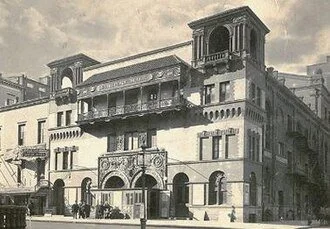One thing that’s tough about researching and writing a nonfiction book is finding interesting stories that you incorporate into your chapter, figure out they don’t work with the story the chapter in telling, and then cut. I finished revising my boxing chapter, so now I have two sample chapters, hooray! So here’s what got cut to improve the flow: Italian fascism, opera, and elephants.
A cat sleeps on a raised part of the desk, her face on the keyboard portion of a laptop where a picture of three elephants is displayed.
Alfredo Salmaggi, the producer who put on inexpensively priced operas at the Hippodrome, will be a main character in another chapter but was a background character in this one. The connection came through fascist politics, which I discuss in this post. Salmaggi lived in the US from a young age, but in the mid-1920s when he sailed home to find operatic talent. This was where he ran into Mussolini — more specifically, to a girlfriend of the married Mussolini who had operatic aspirations. There was some exchange where staffers asked Salmaggi to take the girlfriend back to the US, he agreed, but she didn’t show. He retained a “blackthorn walking stick” that Mussolini gave him, but otherwise does not seem to have been especially politically engaged.[ii]
A picture of Salmaggi from the Edward Ansara book The Fabulous Maestro: A Remembrance of Alfredo Salmaggi and His Legacy.
One recurring image in my chapter is the smell of elephants. Salmaggi was partially responsible for the Hippodrome retaining its animal smell. The impresario put on six performances of Aida that fall, and he loved to stage the triumphal march with horses, elephants, and camels.[i] Another Italian-American opera producer, Clemente Giglio, rented the venue for two Sundays in September to present a continuous program of Italian vaudeville. The bill most likely included Giglio’s melodramatic play L’Africanella, which dramatized Italian incursions into Ethiopia from a pro-Italian point of view. Both men had dealings with Benito Mussolini in their past. Giglio actively supported Benito Mussolini’s fascist government, having recently sailed to Italy in order to present the leader with a “golden throne.[iii]”
I can’t find a picture of Giglio, but this is a picture of the Irving Place Theater, where he ran Italian-language movies in the late 1930s and early 1940s. https://en.wikipedia.org/wiki/Irving_Place_Theatre
Giglio’s play had previously run at an Italian-language theater in New York with a lion tamer and “a troupe of seven trained lions”.[iv] This time around, he wanted performing elephants. He ended up booking Powers Dancing Elephants, the old troupers who had worked there on and off since the days of Thompson and Dundy. Their first trainer William Power died in 1920, but his wife Jeannette kept up their act at the Hippodrome under Dillingham and then on the vaudeville circuit. When they returned to the venue, the elephants “trumpeted and squealed” with recognition and excitement at first. They soon discovered that after all the theater’s conversions, the space was much smaller and less hospitable for animals.[v] The crowd was indifferent, and the elephants “lackadaisical.[vi]” They left the “ghost-haunted Hippodrome” with Mrs. Powers and were housed on a quirky estate/utopian compound called the Clarkstown Country Club.[vii] This was a mansion and grounds in Nyack, New York where the owners promoted yoga and taught people to mimic the elephant’s respirations as a way of learning yogic breathing.
Claire Lea and Charles Stuart strike a tree pose in the club gardens
Source: https://nyacknewsandviews.com/blog/2023/06/a-colorful-4th-of-july-extravaganza-at-the-clarkstown-country-club/
[i] Haven’t been able to confirm this for the ones in 1937, he def did at the Hipp in 1933 and 1934, would it just be unremarkable that they were there by 1937? Can cite earlier ones from the Fabulous Maestro book.
[ii] Ansara, Edward. The Fabulous Maestro: A Remembrance of Alfredo Salmaggi and His Legacy : A Biography. 1st Books, 2001.
[iii] “Throne from Ethiopia on Way from Brooklyn to Mussolini.” Brooklyn Eagle, 14 June 1936, p. 3.
[iv] “Africanella: Giglio’s Italian War Play Warmly Received.” Brooklyn Eagle, 18 Jan. 1936, p. 15.
[v] J.B.C. “Where Are They Now? Oom’s Guests.” New Yorker, 16 July 1938, pp. 30–34.
[vi] Mitsukado, Andrew. “Guido Salmaggi -- A Sports Fan.” Honolulu Star-Bulletin, 20 Apr. 1969, p. 46.
[vii] http://palisadesny.com/people/colorful-history-clarkstown-country-club/ For more on the founder, see Love, Robert. The Great Oom : The Improbable Birth of Yoga in America. New York : Viking, 2010. Internet Archive, http://archive.org/details/greatoomimprobab0000love.



